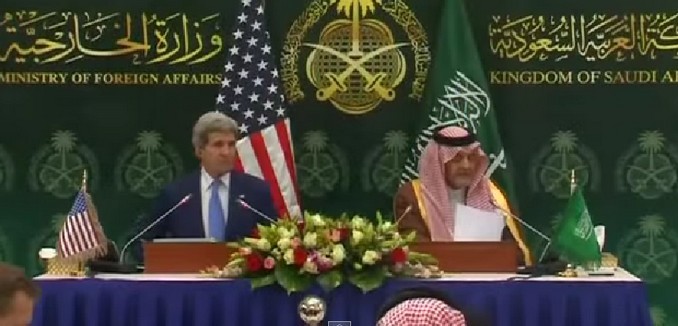In his observations about Secretary of State John Kerry’s visit to Saudi Arabia last week, columnist Tariq Al-Homayed of the London-based Saudi daily Al-Sharq Al-Awsat charged that an agreement between the West and Iran over the Islamic Republic’s nuclear program that fails to end Iran’s occupation of other countries or stop its sponsorship of terror would constitute “a real disaster.”
“The truth is that the joint press conference of the Saudi Foreign Minister and his American colleague completely exposed the differences between them, as well as the extent of the predicament into which the American administration has been thrust following the speech by Israeli Prime Minister Netanyahu to Congress regarding the implicit danger of the agreement that is about to be signed with Iran. Kerry’s statements are an attempt to respond to Netanyahu’s words – which reflect reality: Namely, that as Iran is conducting negotiations with the U.S. and with the West, it is [at the same time] consolidating its conquests in four Arab capitals – Damascus, Beirut, Baghdad and Sanaa. If this is the case, what will the situation be after an agreement with the United States is reached?
“What is currently clear is [one of two things]: Either the American president is striving to attain personal glory, the outcome of which cannot be assessed, or he does not comprehend the implicit of his actions – [this is] a possibility that is closer to reality. The truth is that a bad agreement with Iran is a disaster, and constitutes international recognition of Iran’s occupation of the countries of the region and confers international approval for Iran’s sponsorship of terror. Therefore, the region is facing a real disaster and we do not know how matters will develop until the term of office of President Obama, who is leading the entire region into real disaster, expires.
“It is inconceivable that there will be a nuclear Iran in the region but the rest of the countries of the region stand by. The response to the existence of an Iranian bomb will undoubtedly be an Arab nuclear bomb. If this does not happen, our countries will appear to welcome the Iranian game, and will fall victim to the naïveté of a few people in Washington.
The fear expressed by Al-Homayed were anticipated over a year ago by Jonathan Spyer in Confidence Game: Losing American Support, the Gulf States Scramble, which was published in the December 2013 issue of The Tower Magazine:
Much analysis and attention has been focused on the implications for Israel of these changes in American policy. But Israel is not the biggest loser in the region. On the contrary, Israel is far from isolated in the new Middle East. In fact, its more stable and western-oriented Arab neighbors seem to have more in common with the foreign policy perspective of the Jewish state than at any time in recent history.
Instead, those who have the most to lose are the oil-rich states of the Persian Gulf, especially Saudi Arabia. Control of the Gulf, which is vital to global energy supplies and thus the global economy as a whole, has been the linchpin of American policy in the Middle East for the last half-century. A strong alliance with the Arab monarchies that dominate the Gulf, fueled by credibility of American power, has been at the core of this policy, and this—American military credibility and steadfastness to longstanding foreign policy partnerships—is what appears to be eroding, and causing nothing short of alarm among Gulf leaders.
This, of course, is because of Iran. A central element of Iranian regional policy is expanding Tehran’s sphere of influence into the Persian Gulf, throughout the Middle East, and across the Islamic world. At the moment, the U.S. appears to be softening its approach to Iran, offering the easing of sanctions in exchange for a phantom slowing of the Iranian nuclear program, but without any Iranian concessions in terms of their support for terror or efforts to undermine neighboring regimes. As a result, the Arab states of the Gulf are now terrified at the prospect of abandonment, compounded by what they see as the Obama administration’s questionable competence with regard to the Middle East.
[Photo: Reuters / YouTube ]




